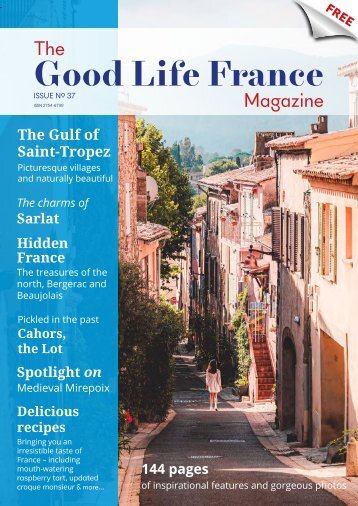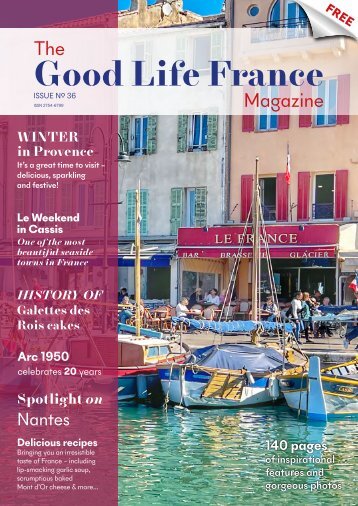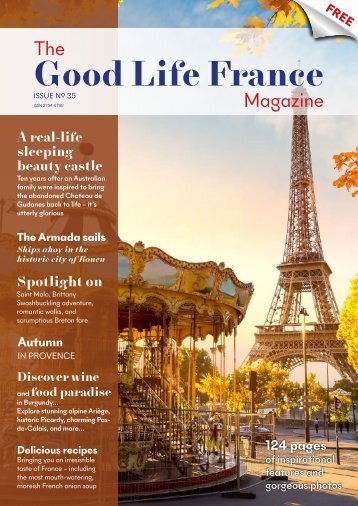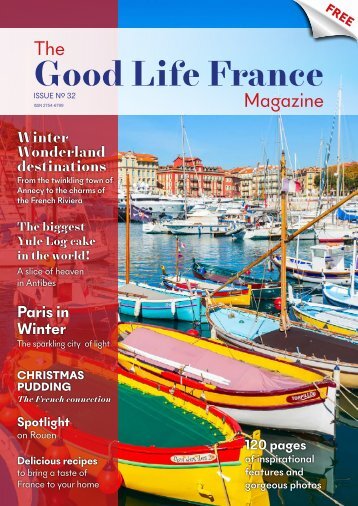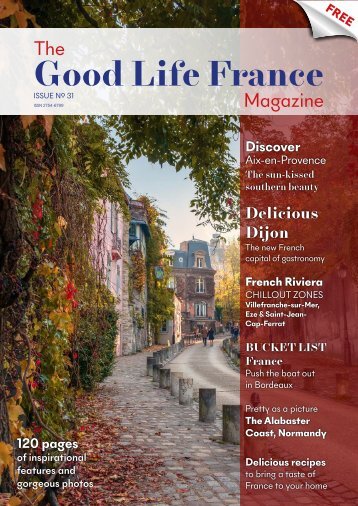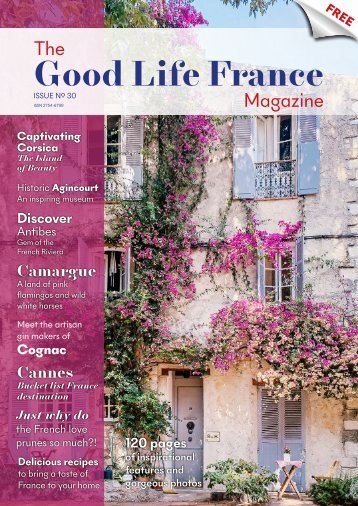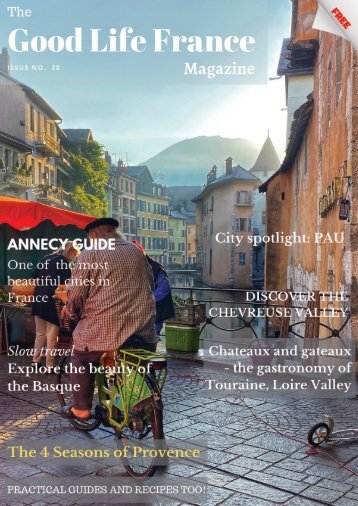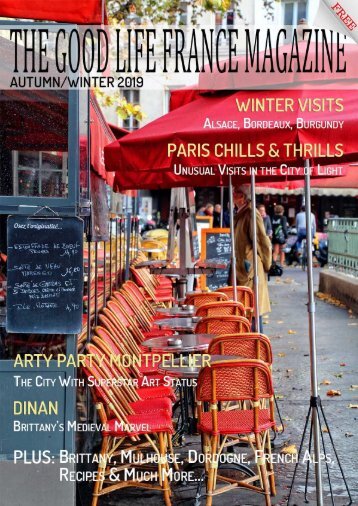
The Good Life France Magazine
The Good Life France Magazine brings you the best of France - inspirational and exclusive features, fabulous photos, mouth-watering recipes, tips, guides, ideas and much more...
Published by the award winning team at The Good Life France
Issue No. 24
TAKING YOUR FIRST STEPS
TAKING YOUR FIRST STEPS IN FRANCE Getting established in any new country does take time. Here are some handy hints to help you settle in France... It may seem obvious, but for anyone moving to France, first brush up or learn to speak some French – it will make life easier and, after all, it's only polite! There's no getting away from it, France is bureaucratic and there is always going to be heaps of paperwork involved. So prepare a file with all your key documents and certificates – birth, marriage, divorce (if applicable) and childrens' birth certificates, wills, driving licences and even pet passports. You’re also going to need a justicatif de domicile i.e. an electricity or phone bill. Get the documents and certificates translated into French by a registered translator - French authorities usually require a copy of the original and a translation, and it makes it easier to have everything ready. Tie up loose ends in the UK – contact utility companies, the tax office and bank to make sure they know you are leaving the country. Apart from tidying everything up, these organisations might have useful advice to offer.
Register in the social security system Once here, getting registered in the social security system is important – do this as soon as possible as it will provide access to healthcare as well as employment, education and various public services. If your French is good, visit the French social security services website ameli.fr or family welfare services caf.fr. For information in English the UK government website also provides an overview. Healthcare Before leaving the UK obtain an S1 form from the Department of Work and Pensions, take this to the local French healthcare authority (CPAM caisse primarie d’assurance maladie) once you arrive. Puma: Protection Universelle Maladie. A universal system of healthcare was introduced in January 2016 The Puma system grants an automatic and continuous right to health care in France to those who are legally resident in the country, basically, healthcare rights come automatically with right of residency. That right is not reliant on the user having paid into the system. In practice, Puma mostly refers to the system of access to healthcare for those who have not built up any rights through social security cotisations via a salary or self-employed work. It includes those who do not have an S1 form, usually held by EU state pensioners. This group consists mainly of early retirees and state pensioners of non-EU states and requires the applicant to obtain a carte de séjour as proof of residency. There may be a requirement to pay an annual fee, known as cotisation subsidiaire maladie (colloquially a “Puma cotisation”). You can fine more details on the French Government website: https:// www.service-public.fr/particuliers/ vosdroits/F34308 You become eligible for French healthcare after three months' residency or as soon as you start work and pay social security contributions. You then need to obtain a Carte Vitale, your employer can probably help you obtain this. Healthcare in France is excellent but as the state covers only 60 – 70% of health costs you need top-up insurance – a Mutuelle – to make sure you are adequately covered. The Mutuelle representative should be able to explain the process and also help you obtain your Carte Vitale. Opening a French bank account quite easy. You can do this before you arrive in France if you prefer, and these days most banks have an English speaking service to make things easier. Take your paper- work and a letter (it may need to be translated to French for some banks) from your UK bank confirming your financial situation to the bank you choose as this will simplify procedures. When it comes to your children Family Allowance Allocation Familiale (AF) is paid by the CAF (Caisse d’Allocations Familiale) from the birth of a second (and any subsequent) child until they reach the age of 18 – should you only have two children payment ceases as soon as the eldest reaches 18. The Allocation Rentrée Scolaire is a one-off payment each September to all children in full-time education (excluding university) and the amount varies according to age. These benefits are only applicable if you work in France and are contributing to the French social security system. Prepare a file with all of your key documents from the UK and get certified French translations done.
- Page 3:
Editor's Letter Welcome to the Autu
- Page 6 and 7:
Features continued 48 Le Weekend: B
- Page 8 and 9:
Where to enjoy wine in winter in Fr
- Page 10 and 11:
ALSACE Alsace is the quintessential
- Page 12 and 13:
BORDEAUX Bordeaux makes for an idea
- Page 14:
BURGUNDY Burgundy’s wines are kno
- Page 18 and 19:
MOCO There are two exhibitions and
- Page 20:
Eat out Locals love: Café Joseph k
- Page 24 and 25:
The medieval town of Dinan in Cotes
- Page 26 and 27:
Head behind the Basilica of Saint-S
- Page 28:
Where to eat in Dinan Just wander t
- Page 32 and 33:
Catacombes de Paris Head 20 metres
- Page 34:
Janine marsh explores the Côtes d
- Page 37 and 38:
Ploumanac’h - Perros-Guirec Perro
- Page 39 and 40: From Paimpol you can take a 10 minu
- Page 41: Where to stay: Hotel Edgar in Saint
- Page 44 and 45: Balades a Raquettes In my search fo
- Page 47: And relax at the Nama Springs Tucke
- Page 50 and 51: Historic centre Looking like someth
- Page 52 and 53: Chateau Museum The Chateau Comtal w
- Page 54 and 55: Eat out Enjoy the local favourite,
- Page 56: Strolling through the Dordogne Vall
- Page 59 and 60: The Dordogne flows 472km from Massi
- Page 62 and 63: Destination: Mulhouse
- Page 64 and 65: Mulhouse in Alsace in the northeast
- Page 66 and 67: Tour du Belvedere Not far from Mulh
- Page 68: Where to eat out in Mulhouse Café
- Page 71 and 72: In Le Havre, Perret delivered an id
- Page 73 and 74: uilt in 1859. Recently restored, it
- Page 75 and 76: New and fab: The Architect is run b
- Page 77: private provence tours Customized t
- Page 81 and 82: COLLIOURE Lonna Coleman captures th
- Page 83 and 84: Collioure is easily reachable by tr
- Page 85: july: Sunflowers in Gascony by Sue
- Page 89: Banking in France Finally, when rec
- Page 95: Why it is essential to talk to your
- Page 98 and 99: ALSATIAN KUGELHOPF (SWEET COFFEE CA
- Page 100 and 101: Leek and Potato Soup INGREDIENTS Fo
- Page 102: Here in the sticks, in the lovely S
Inappropriate
Loading...
Mail this publication
Loading...
Embed
Loading...


